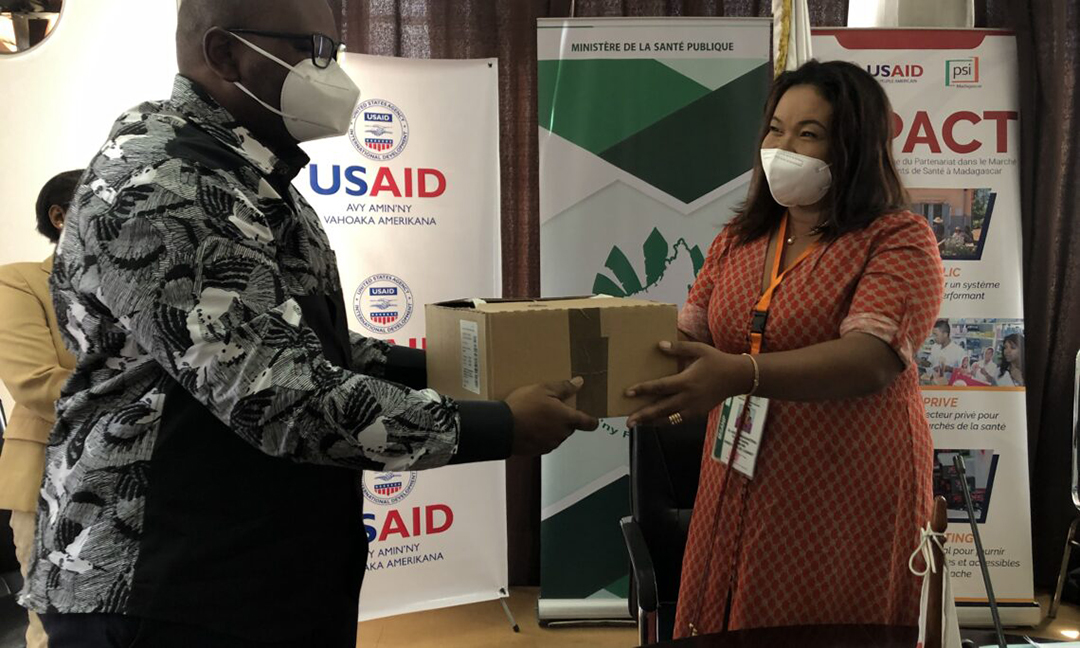Madagascar Receives Medicine to Treat Severe COVID-19 Cases
ADF STAFF
Madagascar has received 4,800 doses of a medicine used to treat people with severe cases of COVID-19.
Valued at $36,000, the medicine is used prevent and treat blood clots, which are common in patients with advanced COVID-19. The U.S. government delivered the medicine on February 19.
“Since the early days of the pandemic, the United States has supported COVID-19 response efforts in Madagascar, and we will continue to do so,” said Sophia Brewer, director of the Madagascar health office of the U.S. Agency for International Development (USAID). “We are steadfastly committed to strengthening Madagascar’s capacity to prevent, detect and respond to the coronavirus disease.”
Officials delivered the medicine weeks after two tropical cyclones battered the island nation, killing more than 100 people. Tropical Cyclone Ana struck northern Madagascar on January 22, followed by Tropical Cyclone Batsirai, which hit eastern Madagascar on February 5.
On February 16, the USAID provided humanitarian funding to furnish temporary housing, clean water and other basic items for 1,500 people displaced by Tropical Cyclone Batsirai.
On March 8, USAID provided $300,000 for temporary housing, clean water and other items to 6,500 people in the cyclone-hit regions of Atsimo Atsinanana, Vatovavy and Fitovinany. USAID is also helping to rebuild and repair health facilities damaged by the storms.
While Madagascar recovers from deadly cyclones and works to prevent the spread of COVID-19, the country’s worst drought in 40 years is driving food insecurity. More than 1.6 million Malagasy are expected to be acutely food insecure from January through April, ReliefWeb reported. Nearly 310,000 in southern Madagascar are likely to suffer from acute malnutrition through August.
In 2021, the U.S. government provided more than $50 million in humanitarian assistance to Madagascar, including emergency food assistance in the southern part of the country. The U.S. also is helping Madagascar respond to outbreaks of plague, measles and malaria.
Continuous U.S. Medical Support
The U.S. government has provided Madagascar with assistance valued at more than $13 million since the pandemic began.
In October and November 2020, USAID donated $29,000 in computer equipment to Madagascar’s Ministry of Water, Sanitation and Hygiene to strengthen response coordination.
In March 2021, USAID provided head-to-toe personal protective equipment to health care workers in 13 areas.
On May 13, USAID donated $10,000 worth of equipment and supplies to six COVID-19 treatment centers. The package included washable coveralls, rubber boots, gowns, filter masks, gloves, hand-washing devices, disinfectant sprays and other cleaning materials.
On September 10, USAID delivered $1.5 million worth of medical materials and equipment, including 200 beds and mattresses, to health centers in the northwestern Boeny and Sofia regions. The donation also included diagnostic tools, birthing kits, intravenous solution stands and scales. USAID made similar donations to the Analanjirofo, AtsimoAndrefana, Atsinanana, Vatovavy and Fitovinany regions.
Going Solar
In 2020, USAID issued a $240,000 grant to train 13 solar entrepreneurs through Nanoé, a French-Malagasy social enterprise. In a nation of 27 million people, only 6.5% of rural households have access to electricity. The grant helped electrify 35 rural health clinics that serve 140,000 people.
The grant is part of the U.S. government’s $3 million plan to increase energy production and electricity access in Madagascar. Since 2018, the initiative has helped more than 57,000 people gain access to electricity. The 2022 goal is to provide electricity to more than 400,000 people.
In 2020, USAID and Power Africa, a U.S. government-led initiative, split a $1.2 million grant among three Malagasy companies to develop mini-grids that brought electricity to more than 5,200 rural homes and businesses.


Comments are closed.